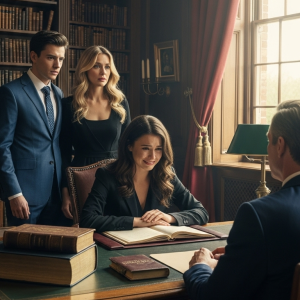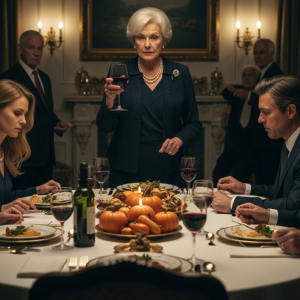The pressure from her son, David, and his wife, Susan, had started subtly. It was a slow, creeping campaign, waged over Sunday dinners and casual phone calls.
“Mom, this house is just so big for one person,” Susan would say, her voice dripping with faux concern as she looked around the beautiful, spacious home Margaret had lived in for forty years. “All the upkeep, the stairs… we worry about you.”
David would then chime in, playing the part of the responsible son. “And the inheritance tax later on, Mom, it’s a nightmare. If you sign the house over to me now, as a gift, it simplifies everything. We can take care of all the maintenance for you. Nothing would change, of course. It would still be your home.”
Margaret, a woman who had been underestimated her entire life, would simply nod and smile. She saw the barely concealed avarice in their eyes. She heard the impatience in their voices. They weren’t concerned for her well-being; they were circling her largest asset like vultures.
So she decided to set a trap. A beautiful, airtight, legally binding trap.
She met with her lawyer, Arthur Vance, a man who had been her friend and confidant for thirty years. He sat across from her, a draft of the complex legal document spread between them.
“Are you absolutely certain about this, Margaret?” Arthur asked, his expression serious. “This isn’t just a shield; it’s a sword. Clause 6B… it’s ruthless.”
Margaret’s gaze was as steady and hard as granite. “When you find a fox cornering your chickens, Arthur, you don’t build a higher fence. You set a trap that ensures the fox never comes back to the farm again. They have left me no other choice. This isn’t about revenge. It’s about teaching a lesson in consequences.”
The day of the signing, David and Susan were buzzing with a poorly disguised glee. They brought flowers. They fussed over her. Margaret played the part of the grateful, slightly confused old woman to perfection.
When Arthur presented the document, a thick stack of pages filled with dense legalese, David barely glanced at it.
“Quite a lot to read through,” he said with a chuckle.
Margaret looked her son directly in the eye, her expression serene. “Everything I do is to protect this family, David. Please, make sure you read it carefully.”
“Of course, Mom,” he said dismissively, already flipping to the final page. He scribbled his signature with a flourish, a fatal act of hubris. Susan signed as a witness, her own signature a triumphant slash. They believed they had just secured their future. In reality, they had just armed the executioner and handed him the warrant.
For a few weeks, the charade continued. David and Susan were exceptionally attentive. Then, one Tuesday afternoon, Margaret went out for her weekly grocery shopping trip. She came home an hour later, humming a tune, her car full of provisions for the week.
The sight that greeted her stopped her heart. Her entire life—her antique furniture, her boxes of cherished photographs, her clothes, her books—was piled up on the front lawn in a chaotic, humiliating jumble.
She walked toward the front door in a daze and tried her key. It didn’t fit. The lock had been changed.
The front door opened, and her daughter-in-law, Susan, stood there, her arms crossed, her face a mask of cold triumph. David hovered behind her, a ghost of a man, unable to meet his mother’s eyes.
“Hello, Margaret,” Susan said, the use of her first name a deliberate act of demotion. “I’m sorry you had to find out this way, but this is David’s house now. We need our own space, our privacy. We’ve found a lovely apartment for you at the Silver Blossoms senior living community. I’m sure you’ll be much happier there, with people your own age.”
Margaret stared at them. She looked at the wreckage of her life on the lawn, at the new, gleaming lock on her front door, at the smug face of the woman who had stolen her home, and at the pathetic, spineless man her son had become.
There were no tears. There was no begging or pleading. A lifetime of quiet disappointment in her son finally coalesced into a single moment of icy, crystalline clarity. She had hoped, prayed, that this day would never come. But she had prepared for it.
She slowly reached into her purse and pulled out her cell phone. She scrolled through her contacts and pressed a single button. Susan watched, a smirk playing on her lips, assuming Margaret was calling a friend to cry to.
The call was answered on the first ring.
“Arthur, it’s Margaret,” she said, her voice perfectly calm, steady, and cold as the grave. “It happened.”
She paused, her eyes locked on her son’s.
“Execute the clause.”
She hung up the phone, gave David and Susan one last, long look of profound and final judgment, and then turned and walked away from the house without another word. Her silence was more powerful, more terrifying, than any scream could ever have been.
That evening, David and Susan celebrated their victory. They opened a bottle of expensive champagne and toasted to their “new beginning” in the house they now owned.
“See? I told you it would be easy,” Susan said, laughing as she looked around the living room, already mentally redecorating. “She’s a sentimental old woman. What was she going to do? Cry a little? She’ll be fine at Silver Blossoms.”
The next morning, they were having breakfast in the sun-drenched kitchen when the doorbell rang, sharp and imperious.
David opened the door to a sight that made the blood freeze in his veins. On his doorstep stood Arthur Vance, Margaret’s lawyer, his face grim and implacable. Flanking him were two uniformed police officers. Beside them stood a burly man holding a toolbox. A locksmith.
“David Thorne,” Arthur said, his voice devoid of any warmth. He did not offer to shake hands. He handed David a thick, legally-sealed document. “I am here to serve you this notice on behalf of my client, Margaret Thorne.”
“What is this?” David stammered, his bravado from the night before evaporating.
Arthur’s voice was as cold and precise as a scalpel. “This is a notice of immediate repossession. As per Clause 6B of the life estate deed you signed three weeks ago, and I quote: ‘Any action, coercive or deceptive, taken to remove the Grantor, Margaret Thorne, from her rightful, lifelong residence within the property shall render this entire deed null and void, with ownership reverting to the Grantor, effective immediately.’”
The color drained from David’s face. Susan, who had come to the door, let out a small, strangled gasp.
But the lawyer wasn’t finished.
“Furthermore,” he continued, his eyes glinting with a cold satisfaction, “the clause also stipulates a punitive penalty for said action. A lawsuit for significant emotional and financial damages is being filed against you and your wife this morning. The funds for said damages will be drawn from your personal assets.”
He gestured to the police officers. “You have created a hostile and illegal eviction scenario. Therefore, the police are here to ensure a peaceful transfer of the property. Ownership has already reverted to your mother. The locksmith is here to change the locks again. You have thirty minutes to collect your personal belongings and vacate the premises. If you remain after that time, you will be arrested for trespassing.”

The perfect plan had just exploded in their faces. They hadn’t just lost the house. They had been outsmarted, outmaneuvered, and financially ruined by the “sentimental old woman” and a few lines of fine print they had been too arrogant to read.
The humiliation was swift and public. David and Susan’s frantic scramble to throw clothes and toiletries into suitcases was watched by several curious neighbors, who had seen Margaret’s furniture on the lawn the day before and were now witnessing the shocking conclusion. The story of their greed and subsequent eviction spread through the neighborhood and their extended family like wildfire.
Margaret, meanwhile, had spent the night in a luxurious hotel suite, paid for by the first withdrawal from the legal fund she had set aside for this very purpose. The next day, she returned to her home. Her home, once more. The locks were new, her belongings were being carefully moved back inside by a professional moving company, and the faint, toxic presence of her son and his wife was already beginning to fade.
She didn’t just win; she thrived. She won the lawsuit, the settlement leaving David and Susan in financial ruin. But she didn’t do it for the money. She did it for the principle.
With the settlement funds, she established a travel account. For the first time in her life, she was completely, utterly free. She took a cruise to Alaska. She walked the ancient streets of Rome. She saw the cherry blossoms in Japan. She sent postcards from every destination, not to her son, but to her friends, living the life she had deferred for far too long.
Her house was no longer a quiet, lonely place. It was her sanctuary, her home base, filled with artifacts from her travels and the laughter of friends. She had lost a son, but she had gained the world. She had discovered that her own independence, her own self-respect, was the best companion she could ever ask for.
One evening, sitting on her patio with a glass of wine, she looked at a postcard she was about to send to her lawyer, Arthur. It was a picture of her, smiling, standing before the majestic fjords of Norway. On the back, she wrote a simple message.
“Thank you for helping me protect the family. Turns out, it was a lot smaller, and a lot happier, than I thought.”
She had turned the most painful betrayal of her life into the ultimate liberation, proving that true wealth wasn’t a house, but the courage to live life completely on one’s own terms.
While the ruins of her son’s life settled into the dust, Margaret was experiencing a renaissance. She had chosen Tuscany as her first extended destination, renting a small, sun-drenched villa surrounded by lemon trees and ancient olive groves. The air itself felt different here, thick with the scent of rosemary and the promise of a life unburdened by the past.
Her days were not idle. She enrolled in a local cooking school, her hands, once accustomed to tending her suburban garden, now learning to shape pasta under the tutelage of a boisterous, laughing Italian woman named Sofia. She learned the nuances of the Italian language, her mind, which her son had dismissed as aging and slow, proving to be sharp and eager.
She made friends. Not the superficial acquaintances of her old neighborhood, bound by proximity and polite obligation, but real friends. Sofia, the cooking instructor; an Australian couple who were artists; a retired history professor from Montreal. They would gather on her terrace in the evenings, sharing wine and stories as the sun set over the rolling hills, painting the sky in shades of orange and violet.
One evening, as she looked out at the breathtaking landscape, a fleeting image of David’s face entered her mind. She felt not a surge of anger, but a wave of cool, detached pity. For years, she had believed her purpose was to maintain a home for him, a legacy to pass down. She realized now that the house had not been a home, but a cage. Her son’s betrayal had not been an ending; it had been a key, unlocking the door and setting her free.
She was not a victim who had survived a terrible ordeal. She was a prisoner who had, at long last, been liberated. This new life, this vibrant, joyful existence, was the true inheritance she had been fighting for. She had just never realized it was her own.
Meanwhile, David and Susan were living in their own version of Italy—a cramped, third-floor apartment in a dingy complex they derisively called “Little Sicily” due to its noisy, bustling atmosphere. The thin walls offered no privacy, and the constant soundtrack of their neighbors’ lives was a grating reminder of their own precipitous fall.
The grand home they had briefly possessed was a distant, taunting memory. Their savings had been wiped out by the lawsuit. Their credit was destroyed. David, once a manager at a respectable firm, now worked a grueling, commission-based job at a call center, facing a daily barrage of angry customers and the condescending supervision of a manager ten years his junior.
The partnership, once a tight alliance of greed, had curdled into mutual contempt. The stress of their financial ruin had stripped away the veneer of affection, revealing the ugly, transactional nature of their relationship.
“Did you pay the electric bill?” Susan asked one evening, her voice flat, not looking up from the cheap reality show flickering on their television.
“I get paid on Friday, Susan,” David snapped, shrugging off his coat. “What do you want me to do? Magic the money out of thin air?”
Susan finally turned to look at him, her eyes filled with scorn. “I wanted you to be a man and handle your mother. I wanted you to read the contract! You were so sure you were the smart one, the one who had it all figured out. But you let your ‘sentimental old woman’ of a mother play you like a fiddle. Some big shot you are.”
“This was your idea!” David shot back, his voice rising. “You were the one whispering in my ear every single day about ‘our future,’ about ‘our space’! I did this for us, and you’ve done nothing but complain since it all fell apart!”
Their fights were a circular, poisonous ritual of blame and resentment. There was no love left, only the shared misery of two people trapped in a prison of their own making.
At his absolute lowest point, drowning in debt and self-pity, David did the only thing he could think of. He decided to call his mother. He wasn’t seeking forgiveness; he was seeking a bailout. After several awkward calls to estranged relatives, he finally got her international number.
The call connected, and the contrast in their worlds was immediate and stark. From his dark, stuffy apartment, David could hear the faint sound of laughter, the chirping of cicadas, and the gentle clinking of glasses in the background. It was the sound of a life being lived.
“Mom?” he said, his voice tentative.
On a sunlit terrace in Tuscany, Margaret excused herself from her friends. She saw the unknown international number and had a feeling she knew who it was. She answered, her voice calm and neutral. “Hello, David.”
“Mom, I… we made a mistake,” he began, his voice cracking with a practiced, pathetic sorrow. “We’re ruined. The lawsuit wiped us out. I lost my job. We’re about to be evicted from this horrible apartment. You can’t… you can’t just let this happen to me. I’m your son.”
Margaret listened patiently to his tale of woe. There was no apology for his actions, no remorse for the pain he had caused her. There was only a demand, cloaked in a thin veil of desperation. He hadn’t learned a thing.
She stepped to the edge of the terrace, looking out at the golden hills. “David,” she said, her voice gentle but firm as steel. “The consequences you are facing are the result of choices you made. You are a grown man. You are responsible for your own life.”
“But you have so much now! It’s not fair!” he protested, his voice rising to a whine.
“You are mistaken,” Margaret replied, a profound peace settling over her. “What I have has nothing to do with money. I have friends who value me. I have new experiences that excite me. I have my freedom and my self-respect. That is a kind of wealth you have never understood.” She paused, then delivered the final, liberating blow.
“I am not the source of your problems, David. And I will no longer be the solution. I truly hope you find your way. Goodbye.”
She ended the call before he could respond. She blocked the number, a final, quiet severing of a toxic cord.
She returned to the table where Sofia and her other friends were waiting, their faces etched with concern.
“Is everything alright, cara?” Sofia asked, placing a comforting hand on her arm.
Margaret looked at her friend, at the beautiful Tuscan landscape that was now her home, and a genuine, radiant smile spread across her face. It was a smile of pure, unadulterated peace.
“Everything,” she said, her voice clear and bright, “is perfect.”
She raised her glass of Chianti, the wine glowing like a ruby in the late afternoon sun. She took a sip. The taste was not of revenge, which is always bitter, but of something far sweeter. It was the taste of freedom. She had not just survived; she had been reborn.




